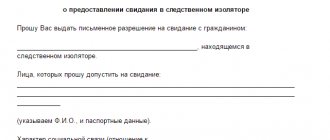The Criminal Code of the Russian Federation provides for several types of punishment and detention in a penitentiary institution. One of these is a colony settlement. If we compare this type of detention of convicts with a prison or colony, then the first can be called the most favorable option, since the conditions are as close as possible to everyday life.
What a settlement colony is, and what things convicts can take there with them - we will consider these questions in more detail below.
Colony settlement - what is it?
A settlement colony is a kind of penitentiary institution, the conditions in which are as close as possible to real ones for a person who is not under punishment.
It goes without saying that there are inspectors and authorities who monitor order and compliance with the regime, but in general the conditions can be called quite benign. However, some rules of the colony still remain - for example, the management can conduct a search at any time, certain types of parcels are prohibited, and if the order is violated, the convicted person can be transferred to a general regime colony or a strict one, depending on what offense he committed.
As a rule, colonies of this type are located in wooded areas, due to the need for cheap labor. By the way, this is also beneficial for the state - the issue with the workers is resolved and there is a greater chance that the convict will not become an asocial person after serving his sentence.
It goes without saying that a person with a negative character, who has previously violated the law and committed a serious offense, will not be sent to a settlement colony.
Types of Colonies
There are two types of such penitentiary institutions:
- Gentle regime - those convicted who committed a crime through negligence, in a state of passion, and so on are sent there. Also, those who have committed a crime intentionally, but not more than average gravity, can be sent here.
- Settlements that are intended for prisoners serving a sentence for a moderate or serious offense, but who have earned such “mitigation” by their diligent behavior.
However, it should be noted that such divisions are conditional, and therefore exceptions are quite possible.
Have a question for a lawyer? Ask now, call and get a free consultation from leading lawyers in your city. We will answer your questions quickly and try to help with your specific case.
Telephone in Moscow and the Moscow region: +7
Phone in St. Petersburg and Leningrad region: +7
Conditions of serving
The conditions for serving a sentence in such penitentiary institutions are regulated by the Criminal Code of the Russian Federation and imply the following:
- There is no strict supervision by inspectors; convicts can move freely around the territory, but on the condition that this is agreed upon with the administration of the colony.
- There is no special clothing; convicts can move around the territory in civilian clothes.
- There are practically no restrictions on parcels, but it goes without saying that weapons, drugs and alcohol are prohibited.
There are also three types of colonies based on gender - male, female, general.
Compliance with the work plan is mandatory, but the requirements of the Labor Code are observed. This means that a work shift cannot be more than 8 hours, the convicted person receives payment for his work and accrues seniority. If desired, you can also get an additional specialty.
What can you take with you?
What can you take with you to a settlement colony? This question is probably asked by every convict. We will consider this question in more detail below. According to the Criminal Code of the Russian Federation, a convicted person can take with him (or receive by parcel or parcel post) the following:
- Clothes, warm things.
- Personal hygiene items.
- Non-perishable products.
- Books, notebooks and other supplies that you may need for studying.
- Bed linen and similar accessories (towels, blankets).
- Money, valuable things.
Medications that contain drugs, alcohol, mobile phones, weapons and the like are prohibited.
In general, it is better to first clarify the list of what is permissible and what is strictly prohibited with the administration of the penitentiary institution, so as not to inadvertently get a violation.
How to send a parcel to a convicted person, transfer, parcel post, money transfer
If your relative is in a general regime prison, then under normal conditions he can receive 6 parcels or packages and 6 parcels during the year. In light conditions - 12 parcels or packages, 12 parcels. Under strict conditions - 3 parcels or packages and 3 parcels.
If your relative is serving a sentence in a high-security prison, then under normal conditions he can receive 4 parcels or parcels and 4 parcels during the year. In light conditions - 6 parcels or packages and 6 parcels. In strict conditions - 2 parcels or transfers and 2 parcels.
If your relative is serving a sentence in a special regime penal colony, then under normal conditions he can receive 3 parcels or packages and 3 parcels within a year. In light conditions - 4 parcels or packages and 4 parcels. In strict conditions - 1 parcel or transfer and 1 parcel.
If your relative is in a general regime prison, then he can receive 2 parcels or parcels and 2 parcels during the year.
In a maximum security prison, a convict can only count on 1 parcel and 1 parcel per year.
The convicted person can receive the first parcel, delivery and parcel immediately upon arrival at the correctional facility.
A certain amount of time must pass between the previous and subsequent parcels, transmission and parcel. This time is equal to the number obtained by dividing 12 months by the total number of parcels, transfers, parcels due to the convicted person per year.
The weight of one parcel or parcel is limited by the postal rules in force in the country. So, currently the maximum weight of a parcel is 20 kg, parcels - 2 kg. The weight of the package should accordingly not exceed the maximum permissible weight of the package, i.e. 20 kg.
When collecting a parcel, parcel or parcel, know that there are food products, things and objects that convicts are prohibited from having with them, receiving in parcels, parcels, or purchasing. This:
— all types of weapons, ammunition, explosive, poisonous, flammable and radioactive substances, lighters; - money, valuables, securities, currency of foreign countries; — optical instruments; — wrist and pocket watches (in prisons); — food products that require heat treatment (except for tea and coffee, milk powder, instant food concentrates that do not require boiling or cooking); — home-canned products, yeast; — all types of alcoholic drinks, beer; — perfume, cologne and other alcohol-based products; - narcotic drugs, psychotropic toxic and potent substances, and without medical indications and medicinal substances, medical supplies; — electronic computers, typewriters, duplicating machines and other office equipment; - knives, straight razors, safety razor blades, piercing and cutting objects, structurally similar to edged weapons; — axes, hammers and other tools; - playing cards; — cameras, photographic materials, chemicals, film cameras, video and audio equipment (except for television receivers, radio receivers), communications equipment and components for them that ensure operation; - any documents (except for documents of the established form, identifying the convicted person, copies of sentences and court rulings, responses based on the results of consideration of proposals, applications, petitions and complaints, receipts for money, things, valuables handed over for storage); — compasses, literature on topography, martial arts, service dog breeding, weapons design; - military and other uniforms, accessories; - clothing, hats and shoes (except for slippers, tracksuits and sports shoes) of unidentified samples; - colored pencils, felt-tip pens, markers, ink, ink, ballpoint and gel pens (except for blue and black), paints, copy paper; — pornographic materials, objects; — electrical household appliances (except for electric shavers, factory-made household electric boilers).
Instead of the required parcels, transfers, parcels, relatives have the opportunity to purchase food and basic necessities through the store, which is located in every correctional facility, and hand them over to the convict.
Currently, in some correctional institutions, relatives of convicts can purchase goods through online stores. Relatives can choose and pay for the purchase, which will be delivered to the convicted person at the correctional facility. The procedure for using the online store can be obtained from the administration of the correctional facility where the convicted person is serving his sentence.
Relatives of the convicted person have the right to send money transfers, which are credited to the personal account of the convicted person.
(Articles 90, 91, 121, 123, 125, 131 of the Penal Code of the Russian Federation; sections XI, XII, XVI of the Rules of the Penitentiary Authority; Decree of the Government of the Russian Federation dated April 15, 2005 No. 221 “On approval of the Rules for the provision of postal services”).
Let's sum it up
What to take with you to a colony settlement? In general, the list is the same as when entering a pre-trial detention center, but it is better to check this with the colony management in advance.
It is a bad omen to renounce prison, but lending a helping hand to someone who is imprisoned is worth it if you personally have nothing against the convicted person.
Each “news from the outside” will cheer you up and prevent you from completely becoming hardened at heart, and will make life a little easier in conditions that are as far from comfortable and desirable for any person as the Earth is from Mars.
So, what can be sent in a parcel to prison, and what cannot?
What is "transfer"?
Such a parcel received the name “transfer” according to the criminal tradition of awarding diminutive names for things, events, etc., associated with the criminal world or characteristic only of it.
The collection of donations is most often carried out by a relative who wants to support a loved one who is deprived of liberty. But it is not prohibited to send parcels from people who are not related to the recipient.
Let's now look at what is possible when transferring to prison, and what is absolutely not allowed. Watch the video about being sent to prison:
How often can I receive parcels?
Having considered what can be transferred to a general, strict, or special regime colony, we will clarify some of the nuances associated with parcels.
Convicted women, as well as everyone who is serving a sentence in penal colonies, have the right to receive parcels, parcels, and transfers without restrictions. For other prisoners, everything depends on the type of correctional institution and the conditions of detention there. These terms are regulated by Articles 121, 123, 125, 127 and 131 of the Criminal Executive Code of the Russian Federation.
► Parcels and transfers to a general regime colony.
- The usual conditions for serving a sentence are six parcels or transfers and six parcels during the year.
- Lighter conditions for serving a sentence - 12 parcels or transfers and 12 parcels during the year.
- Strict conditions for serving the sentence are three parcels or transfers and three parcels during the year.
► Parcels and transfers to a maximum security colony.
- The usual conditions are four parcels or transfers and four parcels during the year.
- Lighter conditions - six parcels or transfers and six parcels during the year.
- Strict conditions - two parcels or transfers and two parcels during the year.
► Parcels and transfers to a special regime colony and to a special regime colony for convicts serving life imprisonment.
- The usual conditions are three parcels or transfers and three parcels during the year.
- Lighter conditions - four parcels or transfers and four parcels during the year.
- Strict conditions - one parcel or transfer and one parcel per year.
The convict can receive the first parcel, delivery and parcel immediately upon arrival at the correctional institution.
????
Acceptable premises
Everything necessary to maintain health and basic hygiene, facilitating the establishment of the minimum comfort possible in prison conditions.
What can be sent in a parcel to prison? It is advisable to put in the transfer:
- personal items (toothpaste, a new brush and only a wooden comb, disposable machines, napkins, toilet paper, sanitary pads (for women), toilet soap, plastic or aluminum mugs, plates);
- warm clothes, a tracksuit, a change of clothes (in a pre-trial detention center) - unless prohibited, cotton socks and warm ones;
- literature for reading, classes, notebooks, pen (if allowed);
- tobacco products (sent even to non-smokers - cigarettes are the internal currency accepted for services by both inmates and guards);
- products.
Watch the video to see how to collect a parcel for prison:
Algorithm for sending a parcel to a pre-trial detention center or correctional colony
Detailed recommendations on how to send a parcel to prison by mail:
- First of all, it is necessary to make a list of things and products needed by the convicted person. Carefully compare it with the list of those permitted for transfer to a pre-trial detention center. Be sure to pack the most necessary things for shipment.
The main list of what can be sent in a parcel to prison:
- Food;
- cigarettes;
- personal hygiene items;
- household products (soap, washing powder);
- clothes (top, bottom).
You also need to put bags, large thick ones and regular cellophane ones.
- When purchasing products from the list, do not buy expensive ones (for example, elite coffee). Better cheaper, but more. It is also important to consider the permitted weight of the parcel. In most pre-trial detention centers, the total permissible weight is 20 kg. If the list of products is long, it is necessary to take into account their final weight.
If the parcel weighs more than permitted, the correctional colony/prison will not accept such a transfer.
- At the post office, purchase a large corrugated box for sending parcels. Before packing food into it, you need to package it in transparent bags. Opaque original packaging is prohibited for delivery to a convicted person.
- It is not necessary to fill out an application with a list of items/products to be transferred to the convicted person when sending by mail, but it is advisable. A list with quantity and weight will make it easier to keep track of the final total weight. There is no need to indicate the names of the products (for example, the manufacturer or type of cookies).
Also, when receiving the parcel, the recipient will be able to control the delivery.
Place a statement indicating the name of the convicted person, his date of birth and a list of products inside the box.
- Pack food and belongings into the box as compactly as possible. There should be as little empty space as possible. Lay objects in layers, on top of each other. Thanks to this, the box will fit much more products.
The best option is to place the heaviest products in the center of the box, and the light ones on the sides. This will center the weight.
It is recommended to pack all items in bags with handles, then carefully place them in a box. This way, it will be easier for the prison staff to hand over the parcel to the convict. And this will ensure the safety of even small items.
- On the box in a specially designated place (lower right part on the form) correctly indicate the addressee's details:
- surname, first name, patronymic;
- date, month, year of birth;
- pre-trial detention center/colony index;
- exact address of the pre-trial detention center/colony.
It is advisable to indicate the cell number of the convicted person in the prison/correctional colony.
If the exact address of the pretrial detention center is unknown, you can find the data via the Internet. The official website contains both the index and the full address where transfers can be sent.
- At the top of the form located on the box, indicate the exact details of the sender:
- surname, first name, patronymic;
- contact phone number;
- zip code, residential address.
This information will allow the pre-trial detention center staff to contact the sender if necessary.
- The last step in shipping is to take the box of food and items to the post office. It is necessary to ensure that the postal employee properly seals it with postal tape. There should be no gaps left. It is important that the adhesive tape adheres tightly to the cardboard.
It is advisable to indicate the amount of declared value. This will allow you to receive financial compensation in case of loss or damage to sent items.
After payment for the parcel, the sender is given a receipt with an individual track number. On the check it looks like a number consisting of 14 digits. With its help, you can track the path of your parcel on the official website of the Russian Post.
It is recommended to keep the receipt until the parcel is delivered to the addressee.
What products can be sent to prison?
With a long shelf life, do not require heat treatment or low temperature for storage, and have factory-made transparent packaging that cannot be used to create edged weapons.
What food items can be sent to prison? Products to be given to prisoners:
- packaged, instant (noodles, mashed potatoes, rice, buckwheat, oatmeal);
- for flavoring food (chicken broth cubes, sunflower oil - preferably homemade or olive oil, onions, garlic - improve the taste of prison food, provide vitamins, strengthen the immune system);
- tea (black, with small or medium leaves, good, but at a reasonable price), milk powder, citric acid for refreshing summer drinks, instant jelly;
- coffee (it’s easier to make a drink from instant, but natural is healthier - choose based on the recipient’s everyday capabilities);
- dry-cured sausage, but salted lard is better - it lasts longer, is more satisfying, healthier, and more affordable. Smoked lard and salted fish are allowed only in the cold season, but not in all institutions;
- from sweets, honey, condensed milk in soft packaging, caramel (all this can be added to food or consumed as dessert);
- butter (in small portions and only for transfer to pre-trial detention centers - a quickly perishable product). It is more rational to transfer ghee, rendered chicken fat;
- dried fruits that do not require special storage conditions are preferable to freshly picked fruits;
- You can transfer canned food, but in isolated cases - the containers will be opened during inspection and the contents will only go to the recipient if he has something to take away the unpacked product;
- bread (small quantity).
Here is the entire list of what products can be sent to prison.
IMPORTANT : Before packing the transfer, remove the products from the cardboard packaging, leaving the transparent plastic one. Place products without transparent original packaging in packaging bags and tie them, but not with a very intricate knot.
Transfer viscous products in thick plastic containers, which will then be used as dishes.
The recipient will share the products received with some of his cellmates - if possible, take this fact into account when determining the volume of product to transfer.
Cigarettes, tea, and sweets replace money for prisoners and are never superfluous . When choosing a specific product, give preference to what is affordable - there is no need to chase the brand.
What can you do in a pre-trial detention center?
Formally, life in a pre-trial detention center is regulated by Order of the Ministry of Justice of the Russian Federation dated October 14, 2005 N 189 “On approval of the Internal Regulations of pre-trial detention centers of the penal system.”
One of the appendices to these rules is a list of what is allowed in a pre-trial detention center. Its full title is “List of basic necessities, shoes, clothing and other industrial goods, as well as food products that suspects and accused may have with them, store, receive in parcels and transfers, and purchase by bank transfer.” We quote it verbatim:
“Suspects and accused may carry, store, receive in parcels, transfers and purchase by bank transfer:
- clothes in one set (including the established sample) without waist belts, suspenders and ties, shoes without arch supports, laces and metal heels:
- shirt;
- suit (jacket), trousers;
- dress;
- skirt, shorts;
- sweater (jacket);
- summer/demi-season jacket;
- winter jacket (coat, sheepskin coat, fur coat);
- tracksuit or dressing gown for women;
- demi-season sports hat (cap, baseball cap), headscarf;
- winter hat (cap, baseball cap);
- gloves (mittens);
- summer/demi-season shoes;
- winter shoes;
- sports shoes;
- slippers;
- underwear no more than 4 sets:
- underpants;
- socks (knee socks);
- bra;
- T-shirt (t-shirt);
- stockings (tights), leggings;
- handkerchiefs (knitted, paper);
- toiletries (toilet, laundry soap, toothpaste (powder), dental floss, toothbrush, plastic cases for soap and toothbrush, comb, comb, nail clippers without sharp elements and files, cotton swabs, cotton pads);
- electric razor, disposable safety razors;
- duffel bag or bag;
- glasses and plastic cases for glasses;
- hand cream (face, body), gauze, hairpins, Vaseline, cotton wool, sanitary tampons, pads, cosmetics, plastic curlers (for women);
- crutches, wooden canes, prostheses (with a doctor’s permission);
- a factory-made household electric boiler or electric kettle with a power of no more than 0.6 kW;
- with the doctor's permission, an electric tonometer, a glucometer, a hearing aid, consumables and batteries for them;
- a washcloth or sponge, a foam sponge for washing dishes;
- ballpoint or gel fountain pen, refills for it (black, purple, blue), a simple pencil;
- writing paper, notebooks, plastic files or folders, postal envelopes, postcards, postage stamps;
- toilet paper, including those issued or purchased in a store (stall) of a pre-trial detention center;
- religious items for body or pocket wear;
- plain white or beige bed linen in one set (two sheets and a pillowcase), towels (no more than 2 pieces), a textile sleep mask, earplugs;
- literature and periodicals from the library of the pre-trial detention center or purchased through the administration of the pre-trial detention center in the trading network, with the exception of materials with extremist, erotic and pornographic content;
- photo cards;
- board games (checkers, chess, dominoes, backgammon);
- plastic or aluminum mug, plastic plate, spoon, fork (plastic mug and cutlery should be intended for hot dishes and reusable);
- diapers, including disposable, disposable diapers;
- child care items, children's clothing (for women with children under three years of age).
The same rules say that suspects and accused persons can the following items in pre-trial detention centers
- Phone cards
- Household chemicals:
- toothpaste (powder),
- shaving cream (gel),
- cosmetical tools,
- intended for use after shaving,
- deodorant,
- liquid soap,
- shower gel,
- shampoo,
- washing powder,
- dishwashing liquid.
- Products (with restrictions, see below)
- Cigarettes (except for minors who are kept in pre-trial detention centers - they cannot smoke)
What is not allowed in a pre-trial detention center?
- Cell phones
- Cards, gambling
- Aerosols
- Products:
- Packaged in metal or glass containers;
- Requiring heat treatment;
- Perishable;
- With an expired shelf life or the date of manufacture of which it is not possible to determine;
- Yeast;
- Alcoholic drinks and beer.
What products are best to put in the transfer to a pre-trial detention center?
Approximately this list is offered by experienced people who know what is allowed in a pre-trial detention center and what is not.
- Vegetable oil - it can be added to the food given to prisoners to improve its taste.
- Bouillon cubes also make food tastier.
- Black tea with medium-leaf and small-leaf consistency. It is better to give two packages - one large and cheaper one to share with your co-carriers, and a second, higher quality one for yourself.
- Instant coffee.
- Cookies or gingerbread.
- Lard is well stored, even if there is no refrigerator, and is a source of animal fat.
- Sausage - smoked, or preferably raw smoked.
- Canned food - but not much, since they must be opened and placed in a plastic container (as mentioned above, products in metal packaging are not accepted), which means they cannot be stored for a long time (this applies to canned fish, meat and condensed milk) .
- Sweets – without filling, non-alcoholic.
- Honey is a source of microelements; it must be transparent and contained in plastic, not glass, containers.
- You should choose ghee butter, which has a longer shelf life.
- Fresh vegetables and fruits.
- Dried fruits – they weigh less than fresh fruits.
- To prepare various drinks, you can transfer milk powder, tomato paste and citric acid, preferring soft plastic or polyethylene packaging.
- Cheese is better smoked.
- Salt, sugar - either in sand or cubes.
You can put instant food in the package - noodles, soups, potatoes, but during inspection the bags will be gutted, so it is better to buy them at the kiosk at the pre-trial detention center. The same can be said about cigarettes. Of course, you can bring them with you, but, alas, during inspection they will be broken to reveal prohibited items.
How to prepare products for transfer?
All products must be in transparent packaging. You will have to pour literally everything into them - coffee and tea, sugar, cigarettes, instant noodles; sweets are also accepted without wrappers. The bags must be tied so that they can be easily untied. It's worth stocking up on additional packages in case some of the main ones break through. Everything brought must be put in a large bag, in which the gifts will go to the prisoner.
Remember that the list of permitted products may be limited in a particular detention center. It is better to clarify by phone in advance what is allowed in a pre-trial detention center and what is not.
What do you need to know about the store in the detention center?
Find out what assortment is available in the store in the detention center itself. The fact is that the total weight of parcels and packages per month is 30 kilograms. These are both things and products. It would be logical if it was something that could not be found in the prison store. In addition, products purchased there are considered “verified” - they are no longer subject to any inspection. Therefore, perhaps, instead of carrying a heavy parcel, it is worth transferring money to a relative. In addition, the relatives themselves can submit an application to the pre-trial detention center, in which they indicate what goods and in what quantity they want to purchase for “their” prisoner.
By the way, Moscow and Moscow region pre-trial detention centers are serviced by online stores. This gives relatives the opportunity to save time, money and nerves and at the same time choose something truly useful, not limited to what is sold in the pre-trial detention center store.
What's not allowed?
The list of items prohibited for transfer includes all perishable products (milk, eggs, meat, yeast), requiring long-term cooking, and substances that cause any kind of intoxication. Sugar may also be on the list of forbidden foods - seasoned prisoners use it to distill prohibited moonshine.
How to send a parcel to prison by mail?
Like a regular parcel or parcel, but taking into account the ban on prisoners receiving certain items.
What can you send to prison? Transfers without weight restrictions are allowed:
Prisoners and those awaiting sentencing are prohibited from sending:
- devices for receiving, storing, exchanging information;
- any types of weapons, lighters, matches, watches, optical instruments;
- any products containing alcohol;
- electrical appliances (except razors and boilers);
- pornographic materials.
What to do if you need to send medications to a convicted person?
“Parcels, parcels and parcels with medicines and medical supplies received by convicted persons in accordance with a medical report are not included in the number of parcels, parcels and parcels established by Articles 121, 123, 125 and 131 of the Criminal Executive Code of the Russian Federation. Medicines and medical supplies are sent to the medical units of the penitentiary system for subsequent use in the treatment of the relevant convict,” says Article 16 of the order “On approval of the internal regulations of correctional institutions.”
Sick convicts and disabled people of groups I or II can receive additional parcels. The question of their quantity and contents is decided by the medical commission or the attending physician of the hospital within the penal system where the person is being treated.
Don’t forget another important point: in addition to parcels, prisoners can also receive money transfers. They are credited to the person’s personal account. He must be notified of the receipt of money no later than three days from the date of receipt.
Permitted postal transfers
The parcel not only takes a long time to arrive, but it is also unknown how long it will be stored at the post office of the destination.
According to Art. 25 Fed. Law of July 15, 1995 N 103-FZ, edited on July 3, 2016, those under investigation or accused have the right to receive any number of parcels, the weight of which does not violate the current postal rules , and parcels with a total weight of up to 30 kg per month.
In order not to become a hostage to the situation and not waste money and time, first find out the list of restrictions for transfer, as well as what products can be transferred to the prison, before you start collecting.
How to properly send a parcel to prison is shown in the example from the video:
Many people sentenced to serve their sentences in a colony-settlement and their relatives do not really know what it is, what the features of this type of correctional institutions are, and they do not know what rights and responsibilities they have while in a colony-settlement. This often causes problems while serving the sentence.
Formally, penal colonies are the mildest type of correctional colonies. This applies to the regime of detention, the number of prohibitions, and the availability of certain material (and not only) goods. The legal status of those sentenced to serve their sentence in a colony-settlement (or “village”, as it is called in prison jargon) is determined by the Criminal Executive Code of the Russian Federation (in particular, special articles: 74, 75.1, 128, 129) and the “Internal Rules correctional institutions", which regulate the rules of the internal life of correctional institutions of all types, including colony settlements.
According to Art. 128 of the Penal Code of the Russian Federation, in colony settlements the following are serving a sentence of imprisonment:
a) persons convicted of crimes committed through negligence and who have not previously served imprisonment;
b) persons convicted for the first time of committing intentional crimes of minor or medium gravity;
c) persons convicted of crimes committed through negligence and who have previously served imprisonment;
d) positively characterized convicts transferred from general and strict regime colonies in the manner prescribed by Article 78 of the Penal Code of the Russian Federation, that is, when the type of correctional institution is changed.
An interesting feature of a colony-settlement is that convicted men and convicted women can be held in one colony. However, as a rule, the male and female parts of the colony are separated by a fence.
As we have already said, a colony-settlement is a special type of correctional institution. Peculiarities begin to manifest themselves from the moment the verdict is passed. The fact is that, according to Art. 75.1 of the Penal Code of the Russian Federation, a convicted person, as a rule, is sent to a colony-settlement himself, “with his own feet.” As stated in this article, the territorial body of the penal system, no later than 10 days from the date of receipt of a copy of the court’s verdict (ruling, resolution), issues an order to send the person to the place of serving the sentence and ensures its direction to a colony-settlement. In this order, taking into account the time required for travel, a period is established during which the convicted person must arrive at the place of serving the sentence.
The procedure for sending convicts to a colony-settlement is established by the Instructions for sending to a colony-settlement those sentenced to imprisonment, in respect of whom the court has made a decision providing for the convicted person to independently proceed to the place of serving the sentence, approved by Order of the Ministry of Justice of the Russian Federation of April 6, 2009 No. 102. According to this Instruction, convicts in respect of whom the court has made a decision providing for independent travel to the place of serving their sentence are sent to colony settlements within the territory of the subject of the Russian Federation in which they lived or were convicted. That is, if you lived or were convicted in a certain region, then you must be sent to serve your sentence in that same region . In exceptional cases, due to the state of health of convicts or to ensure their personal safety, or with their consent, convicts may be sent to serve their sentences in an appropriate correctional institution located on the territory of another constituent entity of the Russian Federation. In addition, convicts are sent to correctional institutions located on the territory of other constituent entities of the Russian Federation, in which there are conditions for their placement, if there is no colony-settlement at the place of residence or at the place of conviction or it is impossible to place them in existing institutions in agreement with the central office of the Federal Penitentiary Service of Russia .
According to the same Instructions, after passing a sentence, if the court decides to independently proceed to the place of serving the sentence, the territorial body of the Federal Penitentiary Service of Russia must: 1) give you an order to send you to the place of serving the sentence; give money for travel, provide food or money for the duration of the journey; create a case file for the convicted person (perform fingerprinting, draw up a questionnaire and take a photograph of you). The order, taking into account the time required for travel, establishes the period within which the convicted person must arrive at the place of serving the sentence. Travel time is determined based on traveling to the point specified in the order by the shortest route with the least number of transfers.
The term of serving the sentence is calculated from the day the convicted person arrives in the colony settlement. In this case, the time the convicted person travels to the place of serving the sentence in accordance with the instructions is counted towards the term of imprisonment at the rate of one day per day, for which he is recommended to keep travel documents for presentation at the correctional institution.
It also happens that there is a real queue to be admitted to a colony-settlement, since the occupancy rate of the colony is less than the number of people who enter there. In this situation, the convict waits until his turn comes, and usually waits where he lived.
Thus, convicts who are allowed to get to the colony-settlement on their own are given quite a lot of freedom, which leads to certain temptations: for example, to hide or not go to serve their sentence on time. However, this is fraught with adverse consequences. In this case, you may be put on the wanted list, and when and if you are found, you will be escorted to a colony-settlement under escort, which is not nearly as comfortable as moving around on your own. In addition, according to clause 4.1. Art. 78 of the Penal Code of the Russian Federation, those sentenced to imprisonment with serving a sentence in a colony-settlement, who have evaded receiving an order provided for in part one of Article 75.1 of this Code, or who have not arrived at the place of serving the sentence within the period established in the order, the type of correctional institution may be changed to correctional general regime colony.
In the colony-settlement itself, the legal status of the convict is quite different from convicts serving their sentences in other types of colonies. In accordance with paragraph “a” of Part 1 of Art. 129 of the Penal Code of the Russian Federation, convicts are held without security, but under the supervision of the administration of the colony-settlement; during the hours from getting up to lights out, they have the right to free movement within the colony-settlement; with the permission of the administration of the colony-settlement, they can move without supervision outside the colony-settlement, but within the boundaries of the municipal entity on the territory of which the colony-settlement is located, if this is necessary due to the nature of the work they perform or in connection with training; may wear civilian clothes; may carry money and valuables; use money without restrictions; receive parcels, packages and packages; can have dates without limiting their number.
Thus, there are a number of important differences from colonies of other species: the absence of armed guards; the opportunity to wear ordinary “free clothes” (in other colonies, as a rule, prisoners are forced to wear a special uniform, which is uncomfortable and often unsuitable for normal life); the possibility of free movement around the colony (in other colonies this is usually not possible - the colony is divided into “local areas”, that is, in the area near the barracks, where prisoners can move); the ability to leave the territory of the colony with the permission of the authorities; the opportunity to have money and valuables with you that you cannot have in pre-trial detention centers and other types of colonies; the opportunity to use money without restrictions (usually in a regular store), which is not the case in other colonies, to receive without restrictions (since such restrictions are not established by law) parcels and parcels, as well as the opportunity to have dates without limiting their number. The latter is especially important, since dating is an opportunity to maintain a live connection with family and friends. Moreover, we are talking about both short-term dates and long-term ones, which allows you to lead a family life close to normal. Of course, in practice, the opportunity to receive visits depends on relations with the administration of the colony, which can reprimand an unwanted prisoner or place him in a punishment cell (punishment cell).
Another feature of settlement colonies is enshrined in paragraph “b” of Art. 129 of the Penal Code of the Russian Federation. Convicts usually live in dormitories specially designed for this purpose. However, convicts who do not commit violations of the established procedure for serving their sentence and who have families, by order of the head of the colony-settlement, may be allowed to live with their families in a rented or their own living space located within the boundaries of the colony-settlement or the municipality on the territory of which the colony is located - settlement. These convicts are required to appear for registration in the colony-settlement up to four times a month. The frequency of registration is established by a resolution of the head of the colony-settlement. The residential premises in which convicts live can be visited at any time by a representative of the administration of the colony settlement. Thus, this provision of the law actually allows prisoners, with the permission of the administration, to live with their relatives in a colony or even outside.
It may seem that living in a colony settlement consists of nothing but joys and advantages. However, in reality this is not the case. Most colony settlements function to use prisoners as free (or very cheap) labor. In colony settlements in the north of the country in the taiga zone, prisoners are usually used for felling timber, that is, they are actually sent to fell trees. Such work in itself is very difficult; moreover, there are frequent cases of work-related injuries when prisoners who do not have the appropriate experience and do not know safety precautions receive serious injuries or even die under fallen trees. The situation is different in the south and central regions of Russia. There, prisoners are usually sent to agricultural work, which is not traumatic, but the working day is not actually standardized. You can forget about the labor code.
In practice, it turns out to be almost impossible to refuse to work in a colony-settlement. Refusal to work entails a punishment cell, and a punishment cell in the future threatens with transfer to a general regime colony. It is enough to receive two punishment cells to be recognized as a “malicious violator” (Article 116 of the Penal Code of the Russian Federation). In this case, the administration may go to court with a petition to change the type of correctional institution to a general regime colony. Few of the prisoners want the prison regime to change for the worse, so the majority agree to go to work under the conditions offered by the colony administration. And these conditions are usually bad.
Despite the provision that “the labor of convicts is regulated by the labor legislation of the Russian Federation, with the exception of the rules of hiring, dismissal from work and transfer to another job” (Article 129 of the Penal Code of the Russian Federation), the labor rights of prisoners are constantly violated. This applies to both working hours (prisoners are often forced to work 10-12 hours) and wages. In most cases, the salary in a penal colony is very small, and the prisoners themselves are afraid to demand an increase. This can be explained very simply: convicts are constantly under the threat of penalties, including in the form of a punishment cell, which in the future may lead to transfer to a general regime colony or denial of parole. It is extremely difficult to win a lawsuit against the colony administration regarding collections, so the majority prefer not to risk it.
Thus, a colony-settlement has both its advantages and its disadvantages (for example, forced labor with violation of the labor rights of prisoners). Under these conditions, it is difficult to develop general recommendations for behavior in a colony-settlement. Actively defending one’s rights in some cases can lead to a positive result, but in others can lead to a worsening of the prisoner’s situation.
What is prohibited?
Order of the Ministry of Justice of the Russian Federation dated December 16, 2016 No. 295 “On approval of the internal regulations of correctional institutions” contains a list of things and objects that prisoners are prohibited from carrying and bringing into a correctional institution. These items should not be included in parcels or transfers to a general, strict or special regime colony. This:
1. Items, products and substances withdrawn from civil circulation.
2. All types of weapons, ammunition.
3. Transport and aircraft.
4. Explosive, poisonous, fire hazardous and radioactive substances, lighters.
5. Money, valuables.
6. Securities, currencies of foreign countries.
7. Optical instruments.
8. Food products that require heat treatment (except for tea and coffee, milk powder, instant food concentrates that do not require boiling or cooking), home-canned products, yeast.
9. All types of alcoholic beverages, beer.
10. Perfume, cologne and other alcohol-based products.
11. Narcotic drugs, psychotropic toxic and potent substances, their analogues and without medical indications - medicinal substances, medical supplies, smoking mixtures.
12. Electronic computers, typewriters, duplicating machines, electronic storage media and other computer and office equipment.
13. Knives, straight razors, safety razor blades.
14. Piercing and sharp-edged objects, including objects and containers made of glass, ceramics and metal (except for aluminum spoons, forks, mugs, plates and canned foods in metal containers).
15. Axes, hammers and other tools.
16. Playing cards.
17. Cameras, photographic materials, chemicals, film cameras, video, audio equipment (except for television receivers, public radio receivers), television receivers with access to the Internet information and telecommunications network and with built-in media players, electronic media and storage devices, mobile communications devices and communications or components for them that ensure their operation.
18. Any documents (except for documents of the established form, identifying the convicted person, copies of sentences and court rulings, responses based on the results of consideration of proposals, applications, petitions and complaints, receipts for money, things, valuables handed over for storage).
19. Topographic maps, compasses, literature and educational videos on topography, service dog breeding, martial arts, training of special forces soldiers, mountain training and parkour, weapons design, production of explosive, poisonous, poisonous, narcotic and potent substances.
????










